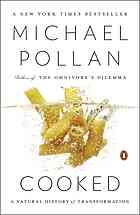
Cooked
Finding Ourselves in the Kitchen
کتاب های مرتبط
- اطلاعات
- نقد و بررسی
- دیدگاه کاربران
نقد و بررسی

Starred review from March 25, 2013
Spurred by a number of objectives—improving his family’s general health, connecting with his teenage son, and learning how people can reduce their dependence on corporations, among others—Pollan (The Omnivore’s Dilemma; In Defense of Food) came to the realization that he’d be able to accomplish all those goals and more if he spent more time in his kitchen. He began cooking. Divided into four chapters based on the four elements, Pollan eloquently explains how grilling with fire, braising (water), baking bread (air), and fermented foods (earth) have impacted our health and culture. In each case, Pollan examines the process as well as the science of barbecue, bread, and beer-making in addition to each particular method’s effect on humanity. Cooking over high heat, for example, enabled primates’ brains to grow much bigger and digest their food faster, making them more efficient; fermented foods like kimchi can promote and encourage the growth of good bacteria in the gut, a function that highly processed foods are unable to accomplish. These and other revelations (obesity rates are inversely correlated with the amount of time spent on food preparation, “microbiologists believe that onions, garlic and spices protect us from the growth of dangerous bacteria on meat,” which could explain why we are drawn to flavorful foods, etc.) make for engaging and enlightening reading. Liz Farrell, ICM.

Starred review from February 1, 2013
Having described what's wrong with American food in his best-selling The Omnivore's Dilemma (2006), New York Times contributor Pollan (Journalism/Univ. of California; Food Rules, 2012, etc.) delivers a more optimistic but equally fascinating account of how to do it right. The author mixes journalistic encounters with tales of skilled, often relentlessly obsessive cooks who demonstrated the art of transforming the products of nature into tasty food and then tried, with spotty success, to teach him to do the same. Four sections describe this transformation with the four classical elements: fire, water, air and earth. Humans cooked with fire first. Preparing meat over an open flame retains its appeal in the ritual of the backyard barbecue, but Pollan illustrates the original in its purest form, working with pit masters of the Old South to roast pigs very slowly over a smoldering wood fire. Cooking with liquids came later when human invented pots, and cooking moved indoors. After musing on the exquisite Zen boredom involved in chopping onions, Pollan discusses his work with an enthusiastic Chez Panisse chef, who schooled him in the subtleties required for perfect stews, braises, soups, sauces and stocks. Air plus grain equals bread; earth provides bacteria and yeasts to perform the alchemy of brewing, fermenting, pickling and cheese-making. Turning food preparation over to corporations saves the average family 30 minutes per day in exchange for an avalanche of extra sugar, salt, fat and chemicals that costs more and tastes worse. A delightful chronicle of the education of a cook who steps back frequently to extol the scientific and philosophical basis of this deeply satisfying human activity.
COPYRIGHT(2013) Kirkus Reviews, ALL RIGHTS RESERVED.

November 15, 2012
Trust New York Times best-selling author Pollan (Omnivore's Dilemma) to turn a discussion of cooking into something both magical and profound. To explain how the products of nature become yummy things to eat and drink, he calls forth the classical four elements--fire, water, earth, and air. Air, for instance, helps turn a glob of flour and water into sweet-smelling bread. When corporations prepare our food, though, we get stuck with megadoses of salt, sugar, and fat while cutting ourselves off from nature and the pleasures of cooking. So go bake that pie!
Copyright 2012 Library Journal, LLC Used with permission.

Starred review from March 1, 2013
Pollan's newest treatise on how food reaches the world's tables delves into the history of how humankind turns raw ingredients into palatable and nutritious food. To bring some sense of order to this vast subject, he resurrects classical categories of fire, water, air, and earth. Pollan visits pit masters to learn what constitutes authentic barbecue. An Italian-trained Iranian American teaches him the subtleties of proper cooking in pots, how to coax maximum flavor from humble vegetables, herbs, meats, and water. Baking trains Pollan to watch, listen, and feel the action of living yeasts in doughs. The harnessing of fungi and molds to ferment sauerkraut and beer and produce cheeses illuminates the fine and ever-shifting boundaries between tastiness and rot and how the human palate can be trained. Four recipes accompany the text, and an extensive bibliography offers much deeper exploration. Pollan's peerless reputation as one of America's most compelling expositors of food and human sustainability will boost demand.(Reprinted with permission of Booklist, copyright 2013, American Library Association.)

























دیدگاه کاربران